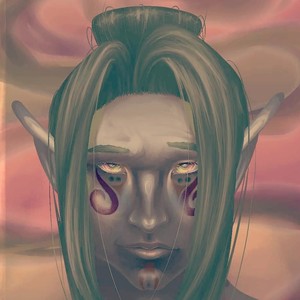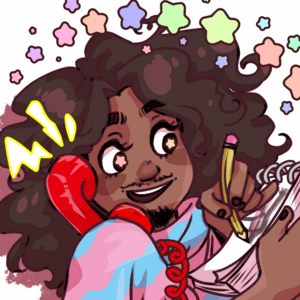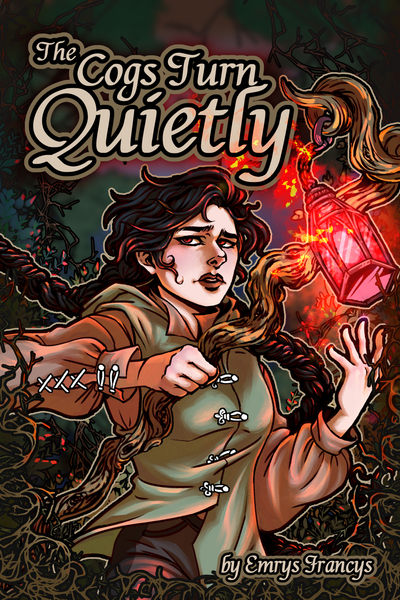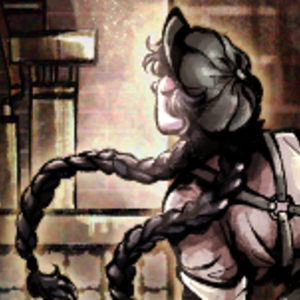Logs cracked. Smoke scented the air.
Someone sang a lullaby in a foreign tongue.
As Taru rolled towards the sweet song, it stopped.
Leather creaked. Cloth rustled.
The air smelt of… coffee?
“Are you awake?”
Taru’s eyes flew open to find the blurry figure of a golden-skinned, silver-haired alfar with familiarly fathomless eyes and a kind smile crouched beside her.
“Good morning, I guess,” they said it like a joke, but Taru didn’t get it.
Instead of laughing, she pushed up onto her elbow, then sat upright and took the bowl she was offered with a quiet, “Thank you.” The bitterness of the brew brought her great discomfort, but the memories it kindled of Enna hunched over his desk, collapsed at the lunch table, flicking through a manual… they brought her the opposite.
“I hope you don’t mind,” the alfar said, their ears twitching as they sat back on their haunches. “I went through your pack. Found these beans near the bottom. I prefer more delicate flavours, myself, but I figured something strong and familiar was going to help you come back round after the… ah… incident.”
Taru watched them over her bowl, and they offered her a strange, thin-lipped smile that lit their eyes with barely smothered humour before darting away. They fidgeted with their bowl, and Taru wondered if, as with Enna, that look didn’t mean amusement. It meant discomfort.
“Sorry I went through your stuff.”
“S’all right,” she muttered hoarsely. “What happened?”
The alfar’s face jerked back to her, eyes darting avidly around her face before their shoulders relaxed. A hand came up, cupping the side of their neck as they said, “The darkness was mimicking one of my pieces. I used to be a sithseiðr.” They hastily explained, “It’s a type of weave-manipulation. From a distant land. Instead of words or herbs or dreams or any of that, sithseiðr use music.” They gestured vaguely across the fire to where Taru’s bag sat back-to-back with a large cushioned box with shoulder straps. “The enchantment you heard was a song of attraction. A strong one.”
“But… you don’t do that any more?”
“Aye. Can’t make music without my instrument, can I? My box is empty. The instrument it’s meant for is currently in the slimy hands of these damn shadows. I’ve been trying to get it back since I got here, what… a fortnight ago? Or however fort the nights get in this place. I’ve slept fourteen times since I lost it, anyway.”
A folding spit framed the fire. From it hanged a bulbous black pot, bubbling in the background as the sithseiðr asked,
“What’re you doing here, then?”
Taru lowered the bowl from her face. “I was asked to come find the elders, to help the people of Laringden.”
“My hometown,” the sithseiðr said. “Have things gotten much worse?”
“I… don’t know what it were like when you were there, but some ancestor trees got cut and this darkness seems to be growing. So… aye, I imagine they’re not much better.” Taru hazarded a glance up to their face.
They downed the contents of their bowl and bolted up onto their feet. “The stew should be ready soon.”
“What’s your name?” Taru asked, wriggling out from under the blankets of her bedroll to follow them to the fire.
“Bhaltair,” they said, still hiding their face as they stirred the pot. “No doubt you’ve heard of me.”
“Coraidh called you an insufferable wretch,” she blurted.
Bhaltair barked a laugh in the direction of the stew.
“Lady Hennessy called you a dear friend,” she stammered.
Bhaltair glanced back at her, smirking, their eyes still gentle. “I don’t know which is more insulting, honestly.”
“I’m Taru Aether Charsen, an engineering manager in training from a city called Shude.”
Bhaltair frowned, and Taru couldn’t tell if they were looking her in the eye or the ear. “I thought they were all human, there,” they said, looking back to the pot.
Taru touched her cheek gently, then moved her fingers back to her unpointed ear, tucking an errant strand of hair behind it. “I have a… a bit of a personal question.”
Bhaltair blinked at her, their brow twitching up.
“Lady Hennessy called you ‘he,’ but Coraidh said it should be ‘they.’”
Bhaltair drew out their, “Ah,” for so long that Taru worried it would never end. “Pronouns,” they chuckled, then shook their head. “Coraidh is very progressive in some ways, but then they ruin it by being a real stick in the mud elsewhere. Using ‘they’ and ‘them’ is a bit old-fashioned, see. (Give me your bowl for this stew. Thanks.) No doubt Cor told you too much about alfar when you spoke. Always spouting off about our people to anyone who’ll listen. Needs tae learn to keep their mouth shut. (Here you go.)
“Anyway, us alfar don’t have any of that gender stuff yous have. We used to be like the vaulted societies: different pronouns for jobs or status or whatnot, but we did away with that about three centuries past, during the last great class war. As a result, we’re all ‘they’ and ‘them,’ now. Though, some contact with the nearby human villages means younger folk around our age have started trying on your human gender roles. The eldest are having none of it. They reckon, as it’s a foreign concept, it’s got no value to us.”
Taru swallowed a mouthful of salty broth and asked, “What do you think?”
“Me? Well,” Bhaltair began, lowering to sit on the ground opposite her, “You can call me he or they or she. Whichever you think fits best. That should tell you all you need to know.”
It didn’t, but something told Taru not to press it. Instead, she quietly ate her stew and tried to think about other things. Mentioning Coraidh had been a bad idea.
The fire dimmed.
“Stop that,” Bhaltair demanded, looking straight at her.
Taru blinked wide eyes back as she chewed on a doughy dumpling. Swallowing and asked, “Stop what?”
“You think I was born yesterday? Every time you had a nightmare, the fire died out. I know a flame-woven when I see—” Their face froze, eyes suddenly distant. Their ears twitched.
“Bhaltair?”
They crossed their lips with a finger, eyes boring into her. They sat in a complete and unsettling stillness. That same stillness took the camp. Though there was little breeze in this place to begin with, the air was now stiflingly stiff, holding Taru rigid like an overwound gear train.
She glanced at where her lantern leant against their packs. The prickling of her skin and the turning of her stomach told her that it not being lit wasn’t a good thing.
Bhaltair straightened opposite her, jerking the bowl up to their face and drinking what was left inside, eyes darting back over their shoulder. Disturbed by their flitting attention, Taru overcame her inertia enough to drink the last of her cooling stew before grabbing for the lantern.
“If you have to light that thing, do it with the campfire,” Bhaltair whispered. “Pulling on the weave right now’ll just draw their attention.”
With no idea how she could pull on the weave, Taru lit the lantern from the fire pit. A flash of red lit up her mind’s eye, but the scorching glimpse of another hand wrapped around the staff burnt itself and all adjacent memories to ash. Then, she heard it: a scratching and scurrying sound that made her itch all over. The lighting of the lantern had the sound retreating, but it didn’t disappear.
“Is that the darkness?” she guessed, and Bhaltair nodded.
“It’s how they sound once they’re turned into it,” they said as she shifted closer to them, imagining she saw figures in the darkness.
“They?”
“Come this way, into the undergrowth. Cover your lantern. We’ll only need it if they come too close.”
The pair of them ducked and scrambled into a patch of bracken, and Taru covered the lantern with her coat.
The clearing they had quit was a watercolour painting of two canvas tents with unmade bedrolls, all vibrant green lit gold with firelight. The logs crackled. The black pot bubbled.
Oozing, slippery darkness dribbled up into a rat-like shape beside the fire. It grew first into a badger, then a wolf, and finally a figure as tall as Bhaltair. Though it stood beyond the flames, the fire didn’t reveal any clothing or even a face: it remained unfathomably black. Every now and then, an ember swirled into it, swallowed into nothing. After a few moments, another lump of darkness began to grow beside it, then another, and another, until there was a small crowd of motionless figures throughout the camp. Some crouched by the 2 bags, about to look inside. Others stood ready to look into the pot. One stooped over where Taru had slept. Like the rest, the first remained still, staring sightlessly into the fire.
“That’s the one who got me,” Bhaltair growled.
“Got you?” Taru whispered, instead of asking how Bhaltair could tell one dark mass from another.
They turned wide eyes on her, like they’d just remembered she was there. “Eh?” Shaking their head, they looked away. “Never mind. It’s bad stuff, these shadows. Steer well clear. Always stick to the path. From what I can tell, they’re fragments of the spirits of creatures taken by the shadows.”
The grotesque figures stood statuesque in their odd between-poses before seeming to soak into the ground and reappear elsewhere. Some came closer. Most stayed away. All except the first. That one stood as if rooted to the spot, consuming smits of swirling flame; becoming more defined with every moment. At one point, Taru even imagined she saw a golden cheek and, above it, an unblinking black eye.
“Corrupt fragments,” Bhaltair murmured. “Not enough of the whole person to be a ghost. Just a… a facsimile. An effigy. A sketch of what the shadows could see that the person couldn’t: their shadow-half.”
The revelation of that unblinking eye revealed an uncomfortable truth: the first wasn’t staring into the fire. Not at all. It was looking above it, beyond it: between the trees and into the bracken. It was looking at Bhaltair.
The shadows stayed until only the most pathetic of embers remained in the fire pit. Then, almost indecipherable from the natural darkness around them, they just… left. Taru only knew that they had gone because the incessant scratching eased and then, finally, ceased. Even then, the vision of the first shadow seemed to linger beside the fire, regardless of Bhaltair standing where it had stood, kicking logs and looking for sparks.
Taru watched as the alfar attempted to rekindle the flame and wondered if they had seen it, too: the unwavering stare; the hint of amusement in the pinch of surrounding skin.
Bhaltair gave up on the fire with a huff and announced that it was hopeless. “We need to move on,” they said, picking up the instrument box. “I’d like to come with you to the elders, if you don’t mind,” they said. “I’d like to help this place see the light, again.”
Taru thought about saying no. She wondered how she would explain that to Bhaltair. Then, wondering if the shadows in this place were somehow worse than what the eldest had become, she shrugged like it was nothing and said, “Sure.” After all, Lady Hennessy had wanted Bhaltair safe, and there was no better way of ensuring that than by keeping her eye on them.












Comments (1)
See all